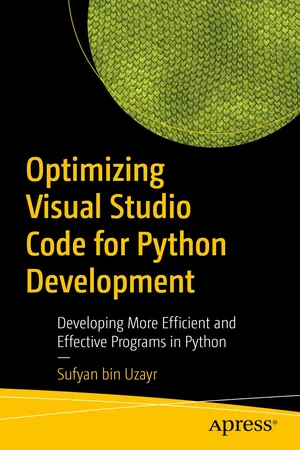
eBook - ePub
Optimizing Visual Studio Code for Python Development
Developing More Efficient and Effective Programs in Python
- English
- ePUB (mobile friendly)
- Available on iOS & Android
eBook - ePub
Optimizing Visual Studio Code for Python Development
Developing More Efficient and Effective Programs in Python
About this book
Learn Visual Studio Code and implement its features in Python coding, debugging, linting, and overall project management. This book addresses custom scenarios for writing programs in Python frameworks, such as Django and Flask.
The book starts with an introduction to Visual Studio Code followed by code editing in Python. Here, you will learn about the required extensions of Visual Studio Code to perform various functions such as linting and debugging in Python. Next, you will set up the environment and run your projects along with the support for Jupyter. You will also work with Python frameworks such as Django and go through data science specific-information and tutorials. Finally, you will learn how to integrate Azure for Python and how to use containers in Visual Studio Code.
Optimizing Visual Studio Code for Python Development is your ticket to writing Python scripts with this versatile code editor.
What You'll Learn
- Execute Flask development in Visual Studio Code for control over libraries used in an application
- Optimize Visual Studio Code to code faster and better
- Understand linting and debugging Python code in Visual Studio Code
- Work with Jupyter Notebooks in Visual Studio Code
Who This Book Is For
Python developers, beginners, and experts looking to master Visual Studio Code
Tools to learn more effectively

Saving Books

Keyword Search

Annotating Text

Listen to it instead
Information
Table of contents
- Cover
- Front Matter
- 1. Introduction to Visual Studio Code
- 2. Getting Started with Python Programs in Visual Studio Code
- 3. Setting Up the Environment and Testing
- 4. Working with Python Frameworks
- 5. Working with Containers and MS Azure
- Back Matter
Frequently asked questions
Yes, you can cancel anytime from the Subscription tab in your account settings on the Perlego website. Your subscription will stay active until the end of your current billing period. Learn how to cancel your subscription
No, books cannot be downloaded as external files, such as PDFs, for use outside of Perlego. However, you can download books within the Perlego app for offline reading on mobile or tablet. Learn how to download books offline
Perlego offers two plans: Essential and Complete
- Essential is ideal for learners and professionals who enjoy exploring a wide range of subjects. Access the Essential Library with 800,000+ trusted titles and best-sellers across business, personal growth, and the humanities. Includes unlimited reading time and Standard Read Aloud voice.
- Complete: Perfect for advanced learners and researchers needing full, unrestricted access. Unlock 1.4M+ books across hundreds of subjects, including academic and specialized titles. The Complete Plan also includes advanced features like Premium Read Aloud and Research Assistant.
We are an online textbook subscription service, where you can get access to an entire online library for less than the price of a single book per month. With over 1 million books across 990+ topics, we’ve got you covered! Learn about our mission
Look out for the read-aloud symbol on your next book to see if you can listen to it. The read-aloud tool reads text aloud for you, highlighting the text as it is being read. You can pause it, speed it up and slow it down. Learn more about Read Aloud
Yes! You can use the Perlego app on both iOS and Android devices to read anytime, anywhere — even offline. Perfect for commutes or when you’re on the go.
Please note we cannot support devices running on iOS 13 and Android 7 or earlier. Learn more about using the app
Please note we cannot support devices running on iOS 13 and Android 7 or earlier. Learn more about using the app
Yes, you can access Optimizing Visual Studio Code for Python Development by Sufyan bin Uzayr in PDF and/or ePUB format, as well as other popular books in Computer Science & Microsoft Programming. We have over one million books available in our catalogue for you to explore.